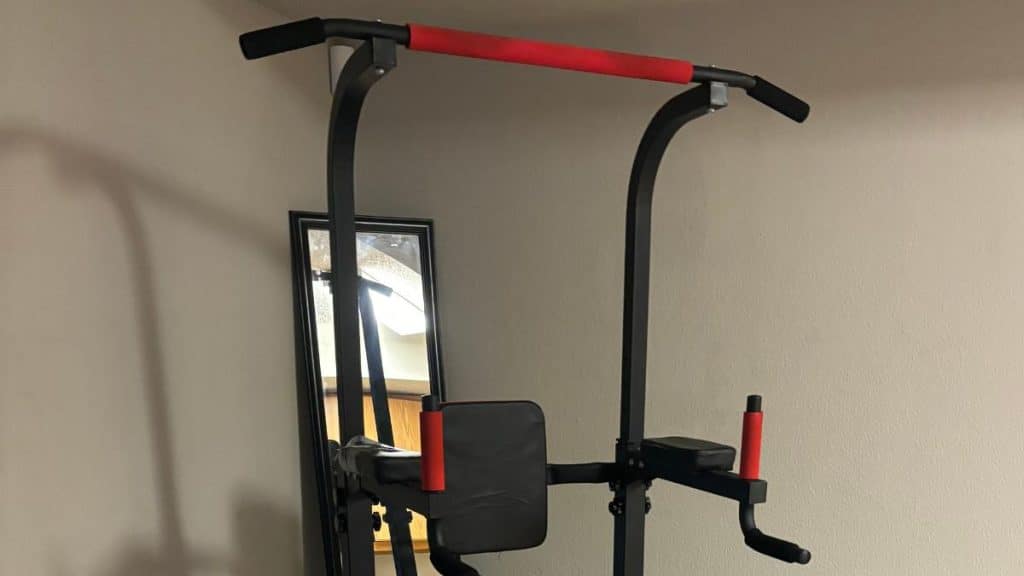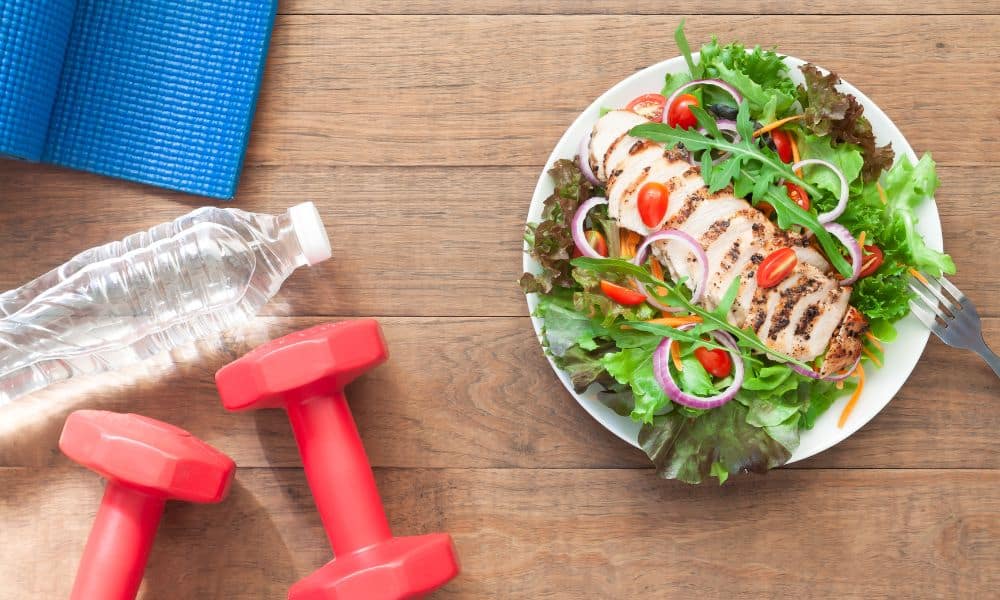Day 22 of my weight loss challenge was packed with activities, from an intense bodyweight workout using my power tower to maintaining discipline in my diet amidst a busy schedule. Despite the challenges, I managed to stay on track with my fitness goals and learned valuable insights about autophagy.
Power Tower Workout
Today, I utilized my power tower to perform a comprehensive bodyweight workout. A power tower is an incredibly versatile fitness equipment that offers numerous benefits for building muscle and improving overall fitness. It allows for various bodyweight exercises, such as pull-ups, chin-ups, push-ups, dips, leg lifts, and squats, targeting multiple muscle groups. This versatility makes it a valuable addition to any workout routine, providing a comprehensive full-body workout without needing various machines.
Power towers are especially effective for building upper body strength and core stability, as exercises like pull-ups and dips engage the back, shoulders, arms, and abdominal muscles. Additionally, performing compound movements helps enhance functional strength, improve muscle coordination, and increase metabolic rate, contributing to better muscle growth and fat loss. The power tower’s compact design makes it suitable for home use, offering a convenient and efficient way to stay fit and build muscle. The exercises I used during my workout included:
- Pull-ups
- Chin-ups
- Push-ups
- Dips
- Leg lifts
- Squats
These exercises provided a full-body workout, focusing on strength and endurance. The power tower has been an excellent tool, allowing me to maintain my fitness routine even when I can’t attend the gym.
Balancing a Busy Schedule
Thursday was particularly hectic. I started with a dentist appointment at 8 a.m. and a long workday from 9 a.m. to 7 p.m. for the Full Sail Hall of Fame. The event included serving pizza, chips, and water from 4 p.m. to 7 p.m. Despite the tempting foods, I stayed committed to my diet, which was a significant win given the circumstances.
Balancing weight loss with a busy work schedule requires strategic planning and consistency. One effective strategy is meal prepping, which involves preparing healthy meals and snacks in advance to avoid the temptation of fast food or unhealthy options. Incorporating short, high-intensity interval training (HIIT) workouts can be beneficial, as these can be done quickly and are highly effective for burning calories and improving cardiovascular health. Additionally, integrating physical activity into daily routines, such as taking the stairs, walking during breaks, or doing desk exercises, can help increase overall energy expenditure.
Staying hydrated is crucial, so keeping a water bottle and setting reminders to drink water throughout the day can help meet hydration goals. Prioritizing sleep is another critical factor, as adequate rest supports metabolism and energy levels, making it easier to stay active and make healthy food choices. Finally, practicing mindful eating, such as eating slowly and savoring each bite, can help control portion and prevent overeating. These strategies, when combined, can make weight loss manageable even with a demanding work schedule.
Achieving Quality Sleep
One of the most remarkable achievements was getting 8 hours of sleep. For someone who has struggled with long-term sleep difficulties, achieving this milestone was incredibly satisfying. Good sleep is crucial for recovery and overall well-being, and this accomplishment was a testament to the changes I’ve been making in my lifestyle.
Regular exercise and an active work routine can significantly enhance the amount and quality of sleep. Physical activity helps regulate the body’s internal clock, or circadian rhythm, promoting a natural sleep-wake cycle. Engaging in exercise increases the production of adenosine, a sleep-inducing chemical in the brain, which leads to improved sleep onset and duration. Additionally, exercise reduces stress and anxiety, common barriers to good sleep. An active workday that includes physical tasks or movement can also contribute to physical fatigue, making it easier to fall asleep at night.
Exercise and productive work improve mood and reduce stress levels, contributing to deeper, more restorative sleep. Moreover, consistent physical activity can help alleviate insomnia and sleep apnea, leading to more uninterrupted and higher-quality sleep. By integrating exercise and active work into daily routines, individuals can achieve better sleep patterns, ultimately enhancing overall health and well-being.
Hydration Challenges
Staying hydrated was challenging this week due to my busy schedule. Drinking enough water is essential, and I aim to consume eight glasses daily. I plan to refocus on this goal in the coming days to ensure I stay hydrated and support my overall health. Proper water intake is crucial during a weight loss challenge for several reasons. First, water helps regulate metabolism, aiding in the efficient breakdown of fats and calories. Staying hydrated also supports digestion and the removal of toxins from the body, promoting overall health and well-being. Additionally, drinking water can help control appetite, as thirst is often mistaken for hunger, leading to unnecessary calorie consumption.
Water also plays a vital role in maintaining muscle function and energy levels, essential for sustaining an active lifestyle and intense workouts. Furthermore, adequate hydration supports skin health, which can be affected by rapid weight loss. Individuals can enhance their weight loss efforts by ensuring sufficient water intake, improving physical performance, and maintaining overall health throughout their fitness journey.
Researching Autophagy
This week, I delved into research on autophagy, a fascinating process that plays a crucial role in maintaining cellular health. Research can be highly beneficial in learning new weight loss strategies and staying motivated during a weight loss journey. By exploring scientific studies, reputable health articles, and expert advice, individuals can discover effective and evidence-based methods to enhance their weight loss efforts. This research can provide insights into the latest nutritional guidelines, exercise routines, and behavioral strategies proven to yield results.
Staying informed about the benefits of various diets, the impact of different workout regimens, and the psychological aspects of weight loss can help tailor a personalized and effective plan. Moreover, understanding the science behind weight loss can boost motivation by reinforcing the rationale behind certain practices, making it easier to stay committed. Regularly seeking new information can also introduce variety and prevent stagnation, keeping the journey dynamic and engaging. By continually educating themselves, individuals can adapt their strategies as needed, overcome plateaus, and maintain high motivation throughout their weight loss journey.
Understanding Autophagy
Autophagy is the body’s way of cleaning out damaged cells and regenerating newer, healthier cells. The process works as follows:
- Initiation: When cells experience stress, such as nutrient deprivation, autophagy is triggered.
- Formation: A double-membrane structure, an autophagosome, forms around the damaged cell components.
- Fusion: The autophagosome fuses with a lysosome, which contains digestive enzymes.
- Degradation: The enzymes break down the damaged components, which are then recycled for cell repair and growth.
Benefits of Autophagy
- Cellular Repair: Autophagy helps remove damaged cells, promoting cellular health and longevity.
- Disease Prevention: It can prevent the accumulation of damaged proteins and organelles, reducing the risk of diseases like cancer and neurodegenerative disorders.
- Metabolic Efficiency: Enhances metabolic efficiency by recycling cellular components for energy.
Integrating Diet, Activities, Sleep, and Research
My approach to reaching my health and fitness goals is holistic, incorporating diet, activities, sleep, and ongoing research.
- Diet: Staying disciplined with my diet, even in challenging environments, ensures I fuel my body with the proper nutrients.
- Activities: A mix of work, play, exercise, and Non-Exercise Activity Thermogenesis (NEAT) helps me burn energy throughout the day.
- Sleep: Prioritizing quality sleep aids in recovery and overall health.
- Research: Continuously learning about processes like autophagy helps me make informed decisions about my health and fitness regimen.
In conclusion, day 22 was a testament to the power of perseverance and flexibility. Balancing a demanding schedule with my fitness goals, achieving quality sleep, and exploring the science behind autophagy have strengthened my commitment to this journey. I remain dedicated to integrating these elements to achieve optimal health and fitness as I continue.




